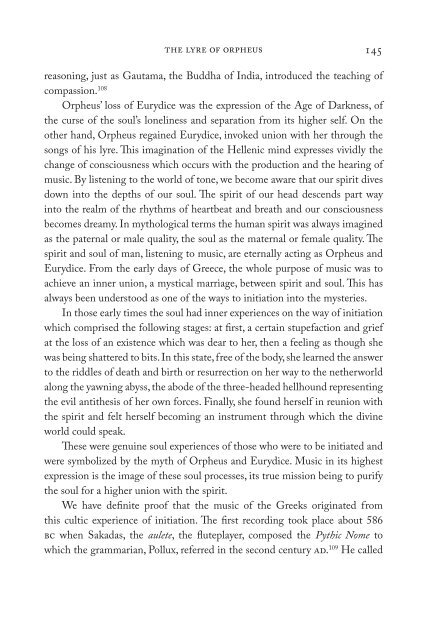The Gospel of Hellas - Research Institute for Waldorf Education
The Gospel of Hellas - Research Institute for Waldorf Education
The Gospel of Hellas - Research Institute for Waldorf Education
You also want an ePaper? Increase the reach of your titles
YUMPU automatically turns print PDFs into web optimized ePapers that Google loves.
the lyre <strong>of</strong> orpheus<br />
reasoning, just as Gautama, the Buddha <strong>of</strong> India, introduced the teaching <strong>of</strong><br />
compassion. 108<br />
Orpheus’ loss <strong>of</strong> Eurydice was the expression <strong>of</strong> the Age <strong>of</strong> Darkness, <strong>of</strong><br />
the curse <strong>of</strong> the soul’s loneliness and separation from its higher self. On the<br />
other hand, Orpheus regained Eurydice, invoked union with her through the<br />
songs <strong>of</strong> his lyre. This imagination <strong>of</strong> the Hellenic mind expresses vividly the<br />
change <strong>of</strong> consciousness which occurs with the production and the hearing <strong>of</strong><br />
music. By listening to the world <strong>of</strong> tone, we become aware that our spirit dives<br />
down into the depths <strong>of</strong> our soul. <strong>The</strong> spirit <strong>of</strong> our head descends part way<br />
into the realm <strong>of</strong> the rhythms <strong>of</strong> heartbeat and breath and our consciousness<br />
becomes dreamy. In mythological terms the human spirit was always imagined<br />
as the paternal or male quality, the soul as the maternal or female quality. <strong>The</strong><br />
spirit and soul <strong>of</strong> man, listening to music, are eternally acting as Orpheus and<br />
Eurydice. From the early days <strong>of</strong> Greece, the whole purpose <strong>of</strong> music was to<br />
achieve an inner union, a mystical marriage, between spirit and soul. This has<br />
always been understood as one <strong>of</strong> the ways to initiation into the mysteries.<br />
In those early times the soul had inner experiences on the way <strong>of</strong> initiation<br />
which comprised the following stages: at first, a certain stupefaction and grief<br />
at the loss <strong>of</strong> an existence which was dear to her, then a feeling as though she<br />
was being shattered to bits. In this state, free <strong>of</strong> the body, she learned the answer<br />
to the riddles <strong>of</strong> death and birth or resurrection on her way to the netherworld<br />
along the yawning abyss, the abode <strong>of</strong> the three-headed hellhound representing<br />
the evil antithesis <strong>of</strong> her own <strong>for</strong>ces. Finally, she found herself in reunion with<br />
the spirit and felt herself becoming an instrument through which the divine<br />
world could speak.<br />
<strong>The</strong>se were genuine soul experiences <strong>of</strong> those who were to be initiated and<br />
were symbolized by the myth <strong>of</strong> Orpheus and Eurydice. Music in its highest<br />
expression is the image <strong>of</strong> these soul processes, its true mission being to purify<br />
the soul <strong>for</strong> a higher union with the spirit.<br />
We have definite pro<strong>of</strong> that the music <strong>of</strong> the Greeks originated from<br />
this cultic experience <strong>of</strong> initiation. <strong>The</strong> first recording took place about 586<br />
bc when Sakadas, the aulete, the fluteplayer, composed the Pythic Nome to<br />
which the grammarian, Pollux, referred in the second century ad. 109 He called

















